David Kirichenko is a Ukrainian-American freelance journalist. Ever since Russia’s full-scale invasion of Ukraine in 2022, David has volunteered to help Ukrainian refugees on the ground in Mexico, Romania, the United States, and Ukraine. Collaborating with Dobra Sprava, a Dnipro-based non-profit organization, David coordinates the procurement and delivery of essential supplies for Ukrainian troops on the front lines. His contributions have facilitated the provision of critically-needed items such as drones, generators, and Starlink communication systems. David can be found on the social media platform X @DVKirichenko.
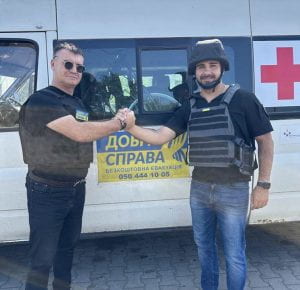
One Ukrainian-American’s travels to the frontlines in Ukraine
In August 2023, I departed to Ukraine for the third time since Russia’s full-scale invasion began 18 months earlier. During my previous trip to Ukraine in 2022, I connected with the Dnipro-based non-profit Dobra Sprava. This time, I came to Ukraine for over three weeks to deliver drones and Starlinks to soldiers fighting on the frontline.
As a child, I had always known that I would play a role in helping the Ukrainian people. And that same spirit I felt as a child, I still feel today. Among nearly two dozen grandchildren, I was the only grandchild who would sit there listening to my grandpa, Vasiliy Kirichenko, tell endless stories about his life experiences. His father, my great-grandfather, was executed by the NKVD, the precursor to the Soviet-era KGB.
The Soviet government murdered my great-grandfather because of his Christian faith and refusal to bend to the will of communist officials. He was captured during World War I and converted by German protestants while he was a prisoner of war. Members of my Ukrainian family were forced to fight for the Russian Empire and the Soviet Union in such wars as the Russo-Japanese war of 1905, World War I, the Russo-Finnish war of 1939-40, World War II and others, despite their protestant pacifist principles.
My grandfather told me about the Ukrainian genocide of 1932-33 (the Holodomor), in which the Soviet Union starved millions of Ukrainians to death in order to crush the Ukrainian countryside’s opposition to Stalinist collectivization – a resistance founded in Ukraine’s desire for freedom, independence, and self-determination. The Holodomor, translated from Ukrainian, means “death by hunger.” The peak of this atrocity was in June 1933, when 28,000 Ukrainians were starving to death every day.
In addition to the widespread death toll within Ukraine, Soviet leaders in Moscow also deported millions of Ukrainians to Siberia and other far-flung corners of the empire. Many, particularly village leaders, simply disappeared into NKVD prisons, while countless others died in transit. After killing off millions and deporting millions (including 180,000 Crimean Tatars), Stalin used social engineering to repopulate eastern Ukraine and Crimea with ethnic Russians and other Soviet citizens with no ties to the regions.
Finally, Stalin imposed a forced assimilation policy by promoting a new Soviet identity centered on Russian language and culture, further suppressing Ukrainian culture and identity. The Holodomor emptied the Ukrainian countryside, allowing Moscow to colonize Ukraine with more Russians, continuing imperialist policies begun under Catherine II centuries earlier.
Grandpa recounted to me that during the Holodomor a cart would come by nearly every day to pick up all the people who starved to death. If my grandpa helped load the corpses onto the cart, they would give him a slice of bread to eat. Like his father during the previous world war, grandpa was also captured by the Germans. I listened to his experiences being in a German camp during WWII. Once liberated by American soldiers, he wanted to return to his family, even though he had the opportunity to emigrate to the United States.
Once he got back to a Soviet Red Army camp, they marched by foot from Germany to western Ukraine. From there, their documents were confiscated and they were locked in a train from the outside, deported to eastern Ukraine to work in a Soviet camp, where he labored alongside German prisoners of war. Once my grandpa was finally freed in the Khrushchev era, he stayed in the area and settled in the Donbas region. As a result, my father was born in Luhansk Oblast. Growing up, children of Russian-speaking colonizers constantly made fun of my father for speaking Ukrainian.
During the Russian Empire and its successor state, the Soviet Union, Russian was promoted, while the Ukrainian language faced deliberate suppression. To advance in society, business, politics, or education within both Czarist and Soviet-ruled Ukraine, people were required to speak in Russian. It became the administrative language and the predominant mode of communication in Ukraine’s urban centers.
Concurrently, Ukrainian was relegated to a lower rank, often dismissed as the language of the countryside and peasantry as officials worked to ensure the Ukrainian language had no high cultural or political currency. In 1863, Pyotr Valuev, the Russian Minister of the Interior, asserted that “a separate Ukrainian language (‘Little Russian’) has never existed, does not exist, and shall not exist.” Additionally, a quote attributed to Tsar Nicholas II reinforced this perspective, claiming “There is no Ukrainian language, just illiterate peasants speaking Little Russian.”
Russia’s current Foreign Minister, Sergey Lavrov, reportedly said that Vladimir Putin only has three advisers: ‘Ivan the Terrible, Peter the Great, and Catherine the Great’. Drawing parallels between his vision and that of Peter the Great, Putin sees both their missions as efforts to reclaim Russian territories. Commenting on the 18th-century tsar’s prolonged Northern War, Putin remarked, “Peter the Great waged the great Northern War for 21 years. It would seem that he was at war with Sweden, he took something from them. He did not take anything from them, he returned [what was Russia’s].”
In a speech to the nation in 2005, Putin also said that the collapse of the Soviet empire “was the greatest geopolitical catastrophe of the century.” Putin and Russia have an obsession over wanting to restore old Soviet glory and, at the same time, for Putin to be viewed in the same light as the tsars of the past. He is obsessed with dragging Ukraine and the rest of Europe back into the past because Russia refuses to let go of it.
In 2021, Putin penned a contentious essay detailing his objectives around Ukraine. He has repeatedly emphasized his belief that Russians and Ukrainians are fundamentally “one people” and implied that Ukraine’s statehood hinges on Moscow’s approval and that Ukrainians have no right to a separate identity.
This stance isn’t novel for Putin. He famously commented to US President George W. Bush in 2008, suggesting that Ukraine isn’t a real country. Like Stalin, Putin views Ukrainian statehood and its national identity as challenges to Russian imperial ambitions. Putin’s determination remains unwavering as he persists in his quest for dominion over Ukraine. His mission to restore the Russian empire via the genocide of the Ukrainian people is a continuation of what Russia has done for centuries.
One thing that always struck me as a child is that I had an aunt who told me she hated speaking and listening to the Ukrainian language as she was taught that Ukrainian was the language of the lower class. She says she knows it’s wrong but she was conditioned to it. I couldn’t wrap my head around how Russia and the Soviet Union were able to make Ukrainians hate themselves.
As a child, I always loved reading books and watching documentaries. After hearing my grandpa’s stories, I would read about Ukrainian history. In discovering how bloody and complex Ukraine’s story is, there was always one factor that bound the Ukrainian people and spirit together – something that Ukraine’s greatest freedom fighter, poet Taras Shevchenko (1814-1861), spoke about. Freedom was the greatest value of all, and Shevchenko believed that it should be the uniting principle for people, regardless of ethnicity or religion.
For centuries, Ukrainians were butchered, slaughtered, and starved for simply being Ukrainian and wanting to be a free people. That spirit of freedom that I felt as a boy took over me once Russia’s full-scale invasion happened and it has become a life mission of mine to fight for freedom. Never have I ever felt so in tune with the spirit of my ancestors and what feels like destiny.
The Journey
As I bought my airplane ticket to Poland, I spoke with Alina from Dobra Sprava and asked her to communicate with soldiers on the frontline and ask them what their biggest needs were. Alina presented me with a list of what soldiers needed. I immediately began contacting friends and family and everyone I knew who might be willing to help pitch in to help me buy as many supplies as possible.
Given that I was traveling with several large bags filled with drones and Starlinks, Alina Holovko from Dobra Sprava helped arrange for someone to pick me up and drive me from Krakow to Dnipro and ensure I’d be able to deliver all the supplies without issue. At the airport, I was greeted by Pasha, a Ukrainian soldier. His wife and four kids are refugees living in Krakow because the area they live in in Ukraine, near the airport in Dnipro, is bombed nonstop by Russian missiles. Since he has four kids, he can legally leave Ukraine. However, Pasha has been fighting against Russia since 2015 with a few tours of duty. He re-joined the army in 2022 with the onset of the full-scale Russian invasion.
As we began our long journey from Krakow to Dnipro, which took around 14 hours, Pasha told me about his experiences fighting in cities like Sievierodonetsk. His unit was surrounded multiple times, and he thought he would die multiple times. Every time, he escaped from the firefights with his life, but many of his friends did not. Finally, after narrowly escaping death so many times, his wife couldn’t handle it anymore and told him if he didn’t leave the army and stay alive for their four young kids, his bags would be packed and left outside, and he would not have a family anymore.
But for him, leaving behind his friends to fight at the front without him was a paralyzing choice. His nerves were shaken, and he kept apologizing to me for needing to constantly be smoking cigarettes to help steady himself after his experiences in the war. Pasha said he can no longer sleep in the dark or with no noise. He always needs a light on with some TV in the background. He mentioned that on the frontline if things were quiet and there was no artillery pounding their area at night, it meant something was wrong.
Pasha went on to tell me what his battles were like storming Russian lines and trenches. Medics would drive to the very front lines, with no lights on in their cars, they would use night vision goggles to try and pick up all the wounded Ukrainian soldiers. The Russians were a mere dozen feet away at times and couldn’t see the armored car, but could hear it and would begin shooting at the medic as he sped through the area to try and rescue all the wounded.
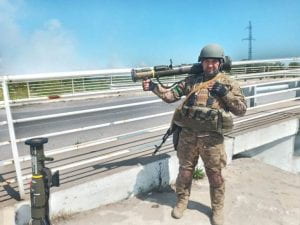
I asked Pasha why he doesn’t consider going to be with his family in Krakow after having fought so long. He told me he wouldn’t be able to leave his country and look in the face of foreigners and tell them why he isn’t in his homeland helping to defend the country. He also told me he is very grateful for the help the Polish people have given to Ukraine and how welcoming they have been to his family, mentioning that:
“My family, along with many other women and young children, were sheltered in a Catholic women’s monastery of the Augustinian sisters in Krakow. I am very grateful to them.”
Pasha told me that what he feared most wasn’t death, but Russian captivity. This fear was the same across most soldiers I spoke with on the frontline. If you were captured, you were likely to come out physically disabled for the rest of your life after being tortured, watching your friends be pummeled or tortured to death, or simply being killed yourself by the Russians.
Drones and Starlinks
Once in Dnipro, we spent our days doing what our nonprofit usually does: delivering humanitarian aid to the frontlines and evacuating civilians from the front. When traveling to deoccupied areas retaken by Ukraine, the locals stated that there are no stores that operate, no electricity, and they are fully reliant on humanitarian aid. Others talked about how when the Russians were there, they threatened to cut the eyes and ears out of those deemed to be pro-Ukrainian.
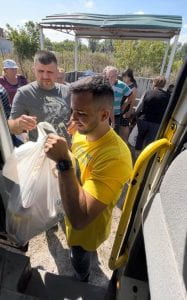
We also spent time going to Ukrainian army units on the front to deliver the drones and Starlinks I had brought from the US. In speaking with soldiers from different units, they all hastened to point out that fighting nowadays without drones will quickly lead to your death. Drones save lives on the frontline.
One drone unit on the front told me about a recent Russian attack in which Russia sent dozens of soldiers to charge as cannon fodder at Ukrainian lines at night. If the Ukrainian units didn’t have a drone in the sky at that moment, they wouldn’t have been able to spot them and call in artillery to protect their trenches from being overrun.
If a Ukrainian position is being constantly bombarded, the Ukrainians are able to deploy drones to deliver basic items like water and even ammunition to units under constant attack.
In what felt like a movie, soldiers from the special unit “Kondor” of the 1st Presidential Brigade of the National Guard of Ukraine picked me up near Lyman, Donetsk. We drove through the forests and backroads towards the Svatove–Kreminna line. Once we got to their base on the front, the soldiers made some coffee for us to sit down and chat, where I was able to conduct interviews. Prior to fighting near Kreminna, they had fought in Bakhmut throughout 2022.
In the Kondor unit, most of the soldiers had some sort of technical background, because they mentioned that it is important to understand how to utilize software and make modifications to drones to improve performance.
I had the opportunity to see how the soldiers conduct drone warfare in action. In essence, every part of the battlefield has to be monitored by drones and all the drones stream their feeds back to base, where the generals on the second line are able to see a clear picture of the entire battlefront. The Ukrainian soldiers also constantly deploy drones to be on the hunt for Russian equipment and soldiers.
If a surveillance drone operator sees a Russian tank or a location full of Russian soldiers, they quickly call artillery to strike that position. At one point, I witnessed a Russian soldier pop his head out of a trench hole and shortly after, watched a drone drop a grenade in that exact location.
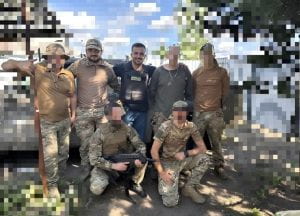
Similarly, a kamikaze drone will find a target and bombard it with explosives. Soldiers showed me how they strap grenades and even customize RPG warheads to attach to drones to hit tanks. They usually spend a lot of time tinkering with explosives and figuring out how to best utilize them.
However, nearly every unit I spoke with told me that they receive all of their drones exclusively from volunteers and different foundations. While the Ukrainian government has made progress in improving the procurement of drones, the needs are simply too great. Oleksiy, a Senior Lieutenant from the 47th Separate Mechanized Brigade, who was fighting on the Zaporizhzhia front near Robotyne, told me that after we delivered supplies, they lost 94 of out 100 drones in two weeks of fighting. He also had a few words to relay to the American public:
“I would like to thank the American people for their help and support. We are very grateful for the help. You can’t imagine how much this help is needed in these times, how important it is. All the aid that is given, we use it wisely. The Mavic drones don’t just help win battles, but they save thousands of lives. If we see Russian armor on the move with drones, we have more time to prepare for battle and this is crucial. You should not worry; at a minimum, this drone will save at least one life. Thank you so much.”
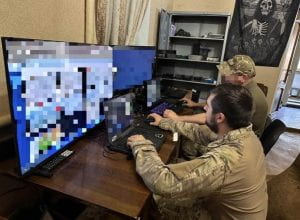
Andriy, also from the 47th Separate Mechanized Brigade, highlights the fact that they need to control their own supply chains to fight. From needing to have a social media presence to make posts asking for money to repair equipment, to buying vehicles after losing some in battle, to procuring life-saving drones and medical equipment, they are reliant on donations and supplies from ordinary people, foundations and foreign organizations.
So much of this war effort is driven by volunteers. Andriy said that without such a strong volunteer force in Ukraine, he doesn’t know what would’ve happened – it would’ve been impossible to fight without all the help coming from volunteers.
The Human Cost
At the front, I interacted with many soldiers. I also participated in evacuating injured soldiers, and visited soldiers in the hospital. I remember speaking with one medic named Oleksandr from Kyiv in a hospital in Dnipro. He had a hole in his throat with a tube to help him breathe. He told me medics on the frontline have to make daily judgment calls about who gets to live and die.
Soldiers use a grading system from 100 to 300 to assess injuries, where a 300 rating would be received by someone who had been ripped to pieces by artillery and was bleeding out with little chance of surviving. Once radioed in, medics need to determine whether it is worth risking their own lives to save the wounded soldier.
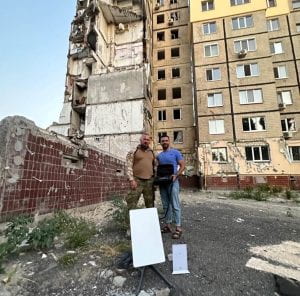
In one case, newly trained medics deployed to one area on the front made a mistake. They were not supposed to gather all of the injured soldiers in one location while waiting for evacuation, but they thought that evacuation would be easier if everyone was grouped together. Therefore, they gathered six injured soldiers in one building that was soon spotted by a Russian drone. Shortly after, Russian artillery struck the building killing everyone, including the medics.
Oleksandr also spoke about running away from Russian drones on three occasions. One time, he had to kick a kamikaze drone that flew at him with explosives. After he kicked it away from him, it exploded and he survived. When Oleksandr asked an engineer about how to survive the mine fields that they have to walk through, he responded that you should aim to have at least two other people in front of you so that in case the mine exploded, they would take the blast and you would have a chance to survive. In fact, most Ukrainian soldiers on the frontline die from either artillery or mine explosions, according to Oleksandr.
But the impact of the war isn’t just felt among active duty military personnel. Oleksandr Dovhal is a good friend of mine and a fellow volunteer with Dobra Sprava — we volunteered together last year in Bakhmut. At the beginning of the war, his wife and two children fled from Dnipro to Italy as refugees, while Oleksandr stayed behind to help with the war effort. Using his own vehicle and his own savings for gas money, he drove under fire to evacuate civilians from cities like Kharkiv in the early days of the war. He continued driving every day until he ran out of money.
At the beginning of the war, he would also drive to the front lines every day to bag the bodies of the dead Ukrainian soldiers and drive them back to their respective regions to be buried. When I asked him if he would consider giving an interview about his experiences, he lowered his head with an all-permeating sadness, remarking that it would be better for him not to talk about these things.
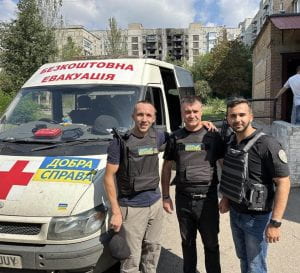
One night in particular, there was a Russian missile strike on Dnipro which landed 1.5 kilometers away from me. I heard the first missile fly past me, then the second, and as I heard the third missile, I remember thinking: “maybe it’s going to hit me and this will be it.” The next morning, while people texted each other to check that everyone was okay and alive, Alina told me it’s really a lottery of who gets to live and die as the Russian strikes kill people at random. Civilians have had to adapt to the ever-changing conditions and continue their lives amid the destruction.
Reflections from the frontline
The first time I approached the Ukrainian base near Horlivka, a city near Bakhmut, the horizon painted a vivid scene of the battles on the frontline. From one end to the other, thick black smoke billowed toward the sky, signaling intense battles. Drawing nearer, the looming threat became palpable: any second, enemy artillery could strike. Once, while delivering supplies to a civilian hospital in Toretsk, an artillery round from Russian forces narrowly missed us. The immediacy was undeniable: I urged everyone to keep moving, fearing that the next shell would hit us.
In speaking with medical workers at hospitals, many say they are depressed because they see no end to the fighting. The Russians bomb cities and kill people every day and destroy what few possessions people have left. Across the frontline, many of the older people who stayed behind in cities under constant Russian bombardment no longer care who rules over them. You see Maslow’s hierarchy of needs in action when people simply ask for food to eat and just want to have some shelter.
It’s hard to make sense of this war when the Russians simply kill and destroy everything in their way. I kept asking myself what the Russians are attempting to conquer and what their aim is. There is nothing left for them to take. I witnessed the same thing last year in Bakhmut, where the Russians bombarded civilians and killed everyone they could.
Once you see the evil that Russia represents, it doesn’t feel real because it’s the same type of evil you read about in history books about the fight against Nazi Germany and the same evil that motivated Soviet leaders to starve Ukrainian peasants. Yet this evil is real and it represents the worst of humanity. This evil wants to grow and spread and it wants to consume and destroy everything in its way.
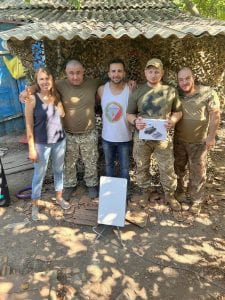
Norman, who leads a unit in the 109th Separate Territorial Defense Forces Brigade, told me that this is a war of the “civilized world vs the uncivilized world.” It is a battle for humanity itself, and if we allow Russia to prevail in this genocidal war, what does that mean for us as humans? This war is a battle of good versus evil, and humanity has not been tested on such a scale since World War II. Russia is extending its historical efforts to carry out its genocidal aims against Ukrainians, which it has done for hundreds of years, while Ukraine continues to fight for its right to exist and be free.
My ancestors would never forgive me if I did not answer the call to fight for the freedom of the Ukrainian people. It is what every Ukrainian has fought for throughout the centuries. Now is the time to secure it for every future generation. If Ukraine fails, this evil will spread throughout the world and humanity will fight more of these wars. I struggle with feeling that I can never do enough and that I could always save more lives – for every Ukrainian soldier deserves to live. I owe it to the brave souls that are giving their lives every day to defend human life, fighting for freedom and the greater good of humanity.
In the words of Taras Shevchenko:
“Our soul shall never perish. Freedom knows no dying. And the greedy cannot harvest fields where seas are lying; cannot bind the living spirit, nor the living word; cannot smirch the sacred glory of the Almighty Lord.”
How you can help: If you want to donate to support Ukrainian defenders with protective gear and life-saving equipment, please continue donating to Dzyga’s Paw.
